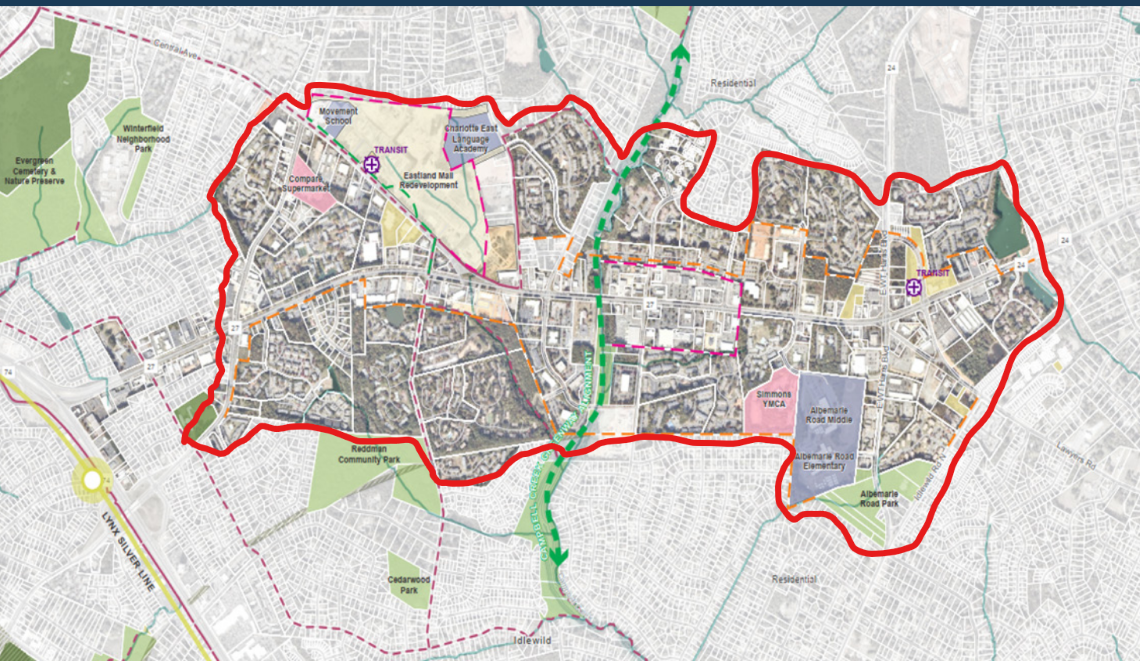Albemarle Corridor Cultural Trail Framework
Announcement
May 21, 2025 - The East CLT Framework Plan document is now available. It details community engagement, project vision and the Cultural Trail alignment. You can view the document under the "Related Information" section of this webpage. The project team looks forward to the community's continued involvement once grant funding has been secured.
- Project typeEconomic Development; Sidewalks, Transportation
- Project budget$400,000
- Project phaseAdvanced Planning & Design (not yet funded for implementation)
 (PDF, 2MB)
(PDF, 2MB)
Map of the area. Click the image above for a larger version.
part of Corridors of Opportunity - Albemarle Road/Central Avenue
Project Overview
In 2020, the City of Charlotte launched the Corridors of Opportunity program to provide job creation, high-quality services and viable, long-term career paths for residents in six neighborhoods located along roadway corridors throughout the city. The city selected the Albemarle Road Corridor as a priority through the Corridors of Opportunity program and conducted a robust study and community engagement process within the neighborhood to understand its residents' needs, challenges and opportunities.
The city summarized findings from the study and community engagement process in the Albemarle Road Corridor Playbook(PDF, 12MB), which identifies next steps along with potential funding sources and partnerships. During the planning and engagement process, the following challenges were identified that could be addressed through the development of the Cultural Trail Framework Plan:
Business & Job Diversity: The corridor has limited employment opportunities and few anchor institutions.
Corridor Aesthetics & Redevelopment: Albemarle Road would greatly benefit from beautification and investment in corridor aesthetics through redevelopment opportunities and protecting existing tree canopy.
Family & Youth: The Albemarle Corridor has many services catering to families, youth and seniors; however, the community needs more targeted activities and programming, as well as community spaces to support these services.
Connectivity Options & Access: Even with existing sidewalks, Albemarle Road is challenging and sometimes hostile environment for pedestrians and cyclists. Opportunities to improve connectivity and access throughout the corridor include investing in new inclusive and multi-modal infrastructure. One key opportunity that emerged from the community engagement process was the concept of a cultural trail that would provide multi-modal transportation for residents while celebrating the neighborhood’s cultural and ethnic diversity.
Those issues and the community idea of a cultural trail led to the recommendation of the Albemarle Cultural Trail with the following strategies:
- Develop pedestrian and bike connections, intersection and crosswalk improvements
- Prioritize completion of planned overland connections and bike routes
- Link sidewalks, walking paths, greenways and trails to create safe east-west pathways
- Identify opportunities for incorporating art, culture and micro-commerce into infrastructure through Public Art and Public Space Master Plans
- Create cohesive wayfinding to key destinations
- Expand the Tree Canopy Preservation Program
The project is roughly located along Albemarle Road and Central Avenue between Sharon Amity Road and WT Harris Boulevard.
Project Goals
- To establish a shared vision for the Albemarle Corridor Cultural Trail with the community.
- To develop branding and wayfinding, inclusive of an identity for the trail, based on the shared vision created with the community.
- To identify existing criteria, processes, and programs to incorporate cultural themes into the trail.
- To develop a framework plan for the trail.
Public Involvement
The project team will engage the community over the course of several months to solicit feedback from the community that will inform the framework plan as it is being developed. So far, the following public meetings have taken place or are scheduled:
March 13, 2025 - Final public meeting at Simmons YMCA
Aug. 6, 2024 - National Night Out
May 14, 2024 - Simmons YMCA
Project Funding
This project is in advanced planning & design and is not yet funded for implementation. Projects in advanced planning are high-priority projects that are identified as candidates for potential future funding. This process of planning and design, which typically takes 12 to 18 months, will eventually produce a cost estimate and will be considered for inclusion in a future budget. Learn more about the Advanced Planning & Design Program.